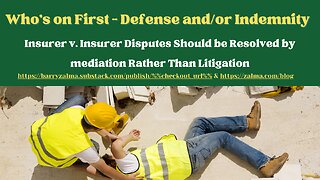No Defense for Assault & Battery
Clear & Unambiguous Exclusion
The insurer sued seeking a declaratory judgment that it need not defend or indemnify defendant TFS NY against a personal injury lawsuit pending in the New York Supreme Court, Kings County.
In Clear Blue Specialty Insurance Company v. TFS NY, INC. d/b/a Sugardaddy's and Tywan Simmons, No. 22-CV-1915 (AMD) (SJB), United States District Court, E.D. New York (September 6, 2023) resolved the dispute.
BACKGROUND
The defendant owns and operates a nightclub. Between April 2019 and April 2020, the plaintiff insured the defendant under a Commercial General Liability insurance contract. Like any other insurance policy, this contract had exclusions. At issue in this case is the scope of a Sublimited Assault or Battery endorsement and a Third Party or Contracted Security exclusion-specifically, whether these provisions require the plaintiff to defend and indemnify the defendant against a lawsuit pending in New York state court.
The parties agreed that the insurance policy was in effect when the incident took place and that Mr. Simmons's lawsuit triggers the plaintiff's duty to defend under the Sublimited Assault or Battery endorsement, because the lawsuit includes negligence claims. They also agree that Castillo was “an outside security company” as defined by the insurance policy.
The policy provides, in part: “We have no duty to defend any insured against any claims or ‘suits’ seeking damages for ‘bodily injury’, ‘property damage’ … or ‘injury’ in regard to the matters covered by this exclusion (outside security services) and we have no duty to pay damages in regard to the matters covered by this exclusion"
DISCUSSION
The plaintiff argues that it has no duty to defend or indemnify against Mr. Simmons's lawsuit, because it disclaimed liability over any “suit” “involving” “operations of any third party or contracted security services provider.” While the defendant agrees that the plaintiff is not liable for claims involving Castillo and does not have to indemnify the defendant for them, it nevertheless contends that the plaintiff must “defend the entire action” because the lawsuit includes claims against the defendant and its employees, who “are covered by [the] policy.”
Insurance Contracts Under New York Law
The duty to defend is contractual in nature. Accordingly, there is no duty to defend where the alleged basis for liability is not within the coverage of the policy.
The Plaintiff's Duty to Defend
The defendant contends that the plaintiff owes a duty to defend because the exclusion is silent as to whether insurance would apply to separate and distinct claims of assault and battery that are made against the defendant and its employees. However, the plain language of the exclusion, which states repeatedly that it “does not apply to any . . . ‘suit' . . . directly or indirectly based on, attributable to, arising out of, involving, resulting from or in any way related to the acts, omissions or operations of any third party or contracted security services provider.”
Mr. Simmons's complaint alleges that he was “assaulted” and “sustain[ed] serious and severe injuries” “as a direct consequence and result of the acts of [all] the defendants.” Mr. Simmons's “suit,” therefore, “involv[es]” a “contracted security services provider” and falls within the exclusion.
The complaint alleges that the altercation was the product of joint action of the defendant, its employees and Castillo, each of which is included in every cause of action. The plaintiff thus has no duty to defend.
Finally, even if there is no duty to defend on the facts alleged in Mr. Simmons's complaint, there might still be a duty to indemnify the defendant if the state court dismisses the claims against Castillo or if the jury decides that the defendant's employees were the only ones involved in Mr. Simmons's assault. But at this time, the exclusion must be enforced, and the plaintiff has no duty to defend.
Duty to Indemnify
Developments in Mr. Simmons's lawsuit may trigger a duty to indemnify. If that happens, the defendant may move to reopen the case. However, since the underlying suit is at the pleading stage, the plaintiff's motion for summary judgment was granted as there is no duty to defend. The defendant may move to reopen on the issue of indemnification if the state court determines that Castillo played no part in Mr. Simmons's assault.
ZALMA OPINION
Clear and unambiguous language in an exclusion will always be enforced. Since the suit alleged that the security service was involved in his assault, battery and injury the exclusion applied and there was no duty to defend. Since little evidence exists for the USDC to rule upon it left open the possibility - slim - that there might be a duty to indemnify. A Solomon-like decision that will not require the death of a baby nor the defense of the security company.
(c) 2023 Barry Zalma & ClaimSchool, Inc.
Please tell your friends and colleagues about this blog and the videos and let them subscribe to the blog and the videos.
Subscribe to Excellence in Claims Handling at locals.com at https://zalmaoninsurance.locals.com/subscribe or at substack at https://barryzalma.substack.com/publish/post/107007808
Go to Newsbreak.com https://www.newsbreak.com/@c/1653419?s=01
Follow me on LinkedIn: www.linkedin.com/comm/mynetwork/discovery-see-all?usecase=PEOPLE_FOLLOWS&followMember=barry-zalma-esq-cfe-a6b5257
Daily articles are published at https://zalma.substack.com. Go to the podcast Zalma On Insurance at https://podcasters.spotify.com/pod/show/barry-zalma/support; Go to Barry Zalma videos at Rumble.com at https://rumble.com/c/c-262921; Go to Barry Zalma on YouTube- https://www.youtube.com/channel/UCysiZklEtxZsSF9DfC0Expg; Go to the Insurance Claims Library – http://zalma.com/blog/insurance-claims-library/
-
 10:17
10:17
Barry Zalma, Inc. on Insurance Law
3 months agoWho's on First - Defense and/or Indemnity
88 -
 1:57:39
1:57:39
Matt Kim
1 day agoShaneyyricch live in Studio
8.98K3 -
 2:57:41
2:57:41
The Charlie Kirk Show
4 hours agoDid Republicans Ban the Bible? + Gone to the Dogs | Rep. Davidson, O'Keefe, Knowles | LIVE 5.2.24
74.6K103 -
 1:43:16
1:43:16
John Burk
3 hours agoAntisemitism bill, Biden in league with big tech on covid, and Al Sharpton returns.
7.56K10 -
 1:38:54
1:38:54
James Kaddis
12 hours agoThe World Just Changed Overnight! Did You Notice?
11.9K3 -
 38:35
38:35
Standpoint with Gabe Groisman
3 hours agoEp. 22. Knesset Speaker on The Challenging Times in Israel. Amir Ohana
15.6K18 -
 17:05
17:05
TENET Media
2 hours agoRepeal The 19th Amendment? | Tim Pool
13.2K43 -
 2:42:14
2:42:14
Russell Brand
7 hours agoPower-Grabbing WHO Pandemic Treaty Is BACK - And It’s Worse Than You Thought- Stay Free #357
148K389 -
 27:50
27:50
Stephen Gardner
3 hours ago🔴Biden makes EPIC MISTAKE Against Trump as TRUTH Leaks out of Court!
18.8K47 -
 4:18:06
4:18:06
Cryptic Hybrid
7 hours agoBreeding Cute Bees & Helping Gnomes. Let's Play Indie Games Time Is Honey & EcoGnomix
21.8K